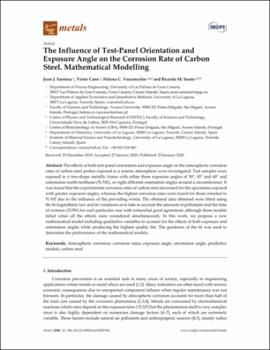The influence of test-panel orientation and exposure angle on the corrosion rate of carbon steel. Mathematical modelling
Date
2020Abstract
The effects of both test‐panel orientation and exposure angle on the atmospheric corrosion
rates of carbon steel probes exposed to a marine atmosphere were investigated. Test samples were
exposed in a tree‐shape metallic frame with either three exposure angles of 30°, 45° and 60° and
orientation north‐northeast (N‐NE), or eight different orientation angles around a circumference. It
was found that the experimental corrosion rates of carbon steel decreased for the specimens exposed
with greater exposure angles, whereas the highest corrosion rates were found for those oriented to
N‐NE due to the influence of the prevailing winds. The obtained data obtained were fitted using
the bi‐logarithmic law and its variations as to take in account the amounts of pollutants and the time
of wetness (TOW) for each particular case with somewhat good agreement, although these models
failed when all the effects were considered simultaneously. In this work, we propose a new
mathematical model including qualitative variables to account for the effects of both exposure and
orientation angles while producing the highest quality fits. The goodness of the fit was used to
determine the performance of the mathematical models.






